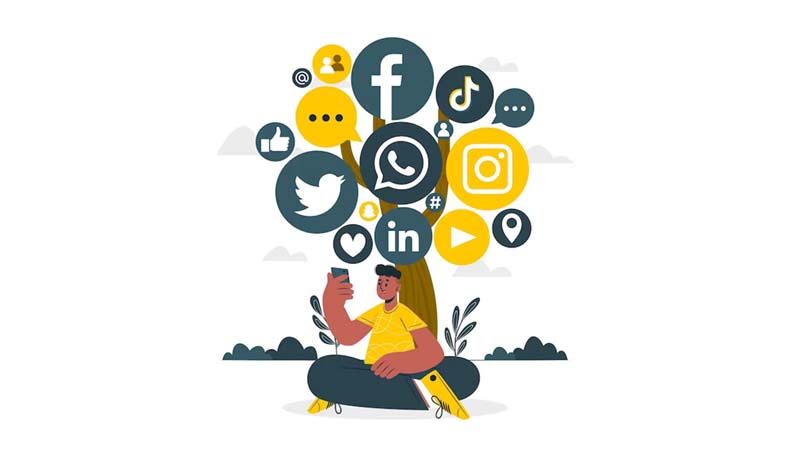Teenagers’ and adults’ perceptions of their bodies might be badly impacted by social media. Yet, there is also inspiring content that strives to support active lifestyles. Social media may have a big impact on how someone feels about their physique, both positively and negatively. Social media can, on the one hand, serve as a forum for body positivity, group support, and fitness and health motivation.
the harm that social media can do to one’s self-image
Unattainable beauty standards
Social media sites frequently display pictures of people with seemingly ideal bodies and looks, frequently enhanced with filters and photo-editing software. This can lead to the creation of irrational beauty standards, which can cause body dissatisfaction and low self-esteem in both men and women.
Competition and comparison
When people compare their bodies to those of others and aspire to match the same beauty standards, social media can foster a toxic culture of comparison and competitiveness. Many people tend to only share the nicest images of themselves, which may not really reflect how they look on a daily basis
Social media’s beneficial influence on body image
Bodily affirming
When social media is handled responsibly, it can serve as a forum for body positivity, as users share pictures of their own bodies to encourage self-acceptance and love. Images of people with various bodies are frequently depicted in body-positive media without being boosted or sexualized.
- The body-positive group: Members of this group looked at several Instagram photos that represented the body-positive movement.
- The captioned group of body-positive people. The Instagram photographs that were being viewed by this group included captions and hashtags to go along with them.
- The command teams. This group looked at a collection of Instagram pictures that were all cityscapes, without any individuals and without any commentary.
According to the results, participants who saw body-positive social media content, whether it included subtitles or not, reported feeling better about their bodies.
Inspiration for a healthy lifestyle
Social media may be a source of motivation for living an active and healthy lifestyle. To motivate people to take care of their bodies, a lot of accounts promote healthy living, exercise, and wholesome eating options.
Support from the community
Those struggling with body image problems might find supportive communities on social media. Support networks and online communities can offer compassion, encouragement, and empathy to people on their path to body positivity.
Here are some key points about social media and body image:
- Social media can contribute to negative body image: Studies have shown that social media use is linked to body dissatisfaction, and exposure to idealized images on social media can lead to negative body image and lower self-esteem.
- Comparison is a big issue: Social media often involves comparing oneself to others, and this can be especially damaging when it comes to body image. Seeing images of people with “perfect” bodies can make others feel inadequate, and can create unrealistic expectations for how one’s own body should look.
- Filters and editing: Social media platforms often provide filters and editing tools that can change the appearance of a person’s body. This can create a false sense of what is “normal” or “ideal” when it comes to body size and shape.
- Body positivity movements: On the other hand, social media has also played a role in promoting body positivity and challenging narrow beauty standards. There are many online communities and influencers promoting body acceptance and self-love.
- Responsibility of users and platform owners: Both social media users and platform owners have a role to play in promoting healthy body image. Users can be mindful of the content they consume and share, and platform owners can work to remove harmful content and promote positive messages.
10 Ways to Improve Your Social Media and Body Image points
Sure, here are 10 ways to improve your social media and body image:
- Curate your social media feed: Unfollow accounts that make you feel bad about your body and follow accounts that promote body positivity and self-love.
- Limit social media use: Set a limit on the amount of time you spend on social media each day to reduce exposure to negative content.
- Focus on your own journey: Remember that everyone’s body is different, and comparing yourself to others can be detrimental to your self-esteem.
- Practice self-love: Take time to appreciate your body and focus on the things you love about yourself. Use positive affirmations and remind yourself that you are worthy and deserving of love.
- Surround yourself with positive influences: Surround yourself with people who support and uplift you, and avoid those who make negative comments about your body or appearance.
- Exercise for health, not appearance: Exercise for the physical and mental health benefits, rather than solely for appearance Instead of concentrating on how you appear after working out, think about how you feel.
- Dress for comfort: Wear clothes that make you feel comfortable and confident, rather than solely focusing on following fashion trends or looking a certain way.
- Be mindful of the language you use: Avoid negative self-talk and use positive, empowering language when speaking about yourself and your body.
- Seek professional help if needed: If you struggle with body image issues, consider seeking the help of a therapist or counselor who can provide support and guidance.
- Practice gratitude: Take time each day to focus on the things you are grateful for, including your body and all that it allows you to do.
Transmit a message Use the Talk to Angel service, which connects clients with therapists, to choose the best therapist. in addition to“online counselor” or online therapy
Also Read: Social Media Marketing Services-What You Need To Know
